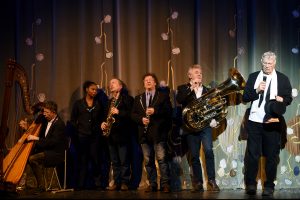Gerhard Polt is an award-winning Bavarian writer, filmmaker, actor, and one of the most highly regarded cabaret artists in Germany. His satire focuses on the Bavarian people, culture and politics with Polt usually playing the role of a feisty Bavarian petit-bourgeois. He enjoys using puns and his texts constantly switch between Bavarian and high German, also including a few English words often used by Germans who want to appear particularly trendy. In 1979, Gerhard Polt first staged Kehraus (Last Dance) in the Werkraum (studio) of the Münchner Kammerspiele, followed by his successful production München leuchtet (Munich Shines) in 1984. Following the musical revue “Fein sein beinander bleibn” by the Well Brothers – formerly Biermösl Blosn, Behold the Man (Ekzem Homo) is a political revue by and with Gerhard Polt and the Well Brothers that first premiered at the Kammerspiele in 2015 and is now celebrating its 70th performance.

Courtesy of Andrea Huber.
The stage is bare except for a harp and a bin, the safety curtain is down. Alpine horns on both sides of the dress circle and bells create an alpine idyll. Gerhard Polt enters holding a pretzel (Breze), thus his character’s name becomes the feisty pensioner Brezner. His pet peeve at the moment are “Grattler” (spongers) and his neighbour Stefan Merki (played by Stefan Merki) seems to be one of them. Merki’s latest offence is blowing his nose so noisily that a blackbird, whose song Brezner was enjoying, flew away in a panic before Brezner could finish his mug of beer. Brezner’s other neighbours are equally annoying – the musicians Michael, Christoph and Karli Well who indulge in “orgies of cacophony”. The safety curtain rises and reveals the idea of three terraced houses separated by a fence.
Brezner’s feud with his neighbour Stefan Merki is the framework of Behold the Man (Ekzem Homo), a revue directed by Johan Simons that intertwines songs by the Well Brothers with short sketches and philosophical musings by Polt, such as his thoughts on man as an intermediate host for all kinds of parasites – viruses, bacteria, insurances, funeral parlours, religions, and foot fungi.
Brezner is strongly opposed to the use of the word “we” because : “I am not ‘we’, I was not ‘we’, ‘we’ are the others.” And in Brezner’s case, the others are his annoying neighbours, especially the “Lohnschauspieler” (actor on a fixed salary, employed by a state or municipal theatre) Merki, whom he loathes with a passion, comparing him to a walking plate mine. Brezner uses a drone to observe what his neighbour is up to, and when Merki is having a barbecue in his backyard with the Well Brothers, Brezner becomes so annoyed that he toys with the idea of murdering Merki. After all, “you don’t necessarily have to be religious to kill somebody.”
The sketches cover a wide spectrum of societal issues, such as the situation of the Catholic Church in Bavaria with priests from Poland and India concocting schemes to lure more Bavarians back into the churches – reintroducing wine, quality hosts, and digital collection bags as incentives. Meanwhile Brezner devises a play on the origin of church tax, based on the Bible casting his neighbour Merki in a bit part.
Gerhard Polt has a great rapport with the audience. He could probably recite a telephone book and still fill the auditorium. One highlight of the evening is his take on the former district commissioner of Miesbach Jakob Kreidl. Relaxing in a bath tub, sipping a glass of champagne he reminisces about the golden age when nature conversation areas were easily changed to industrial parks and moans about the “paparazzi” soiling his good name simply because he accepted gifts and favours from the local bank director. He sees himself as a man of “chronic merits” and regrets the fact that nothing was named after him despite all the good he had done for his district, such as a joint venture for refugees, a project with a “humanitarian aftertaste”.
The Well Brothers master a great variety of instruments: Alpine horns, bagpipes, hurdy gurdy, harp, bass, tuba, flute … and entertain the audience with satirical songs such as “Our Brave Police Force”, “Pork Roast for the World” – to preventthe Islamisation of Europe- and the rap song “Scola Bavaria”as well as presenting a Scottish dance, Egyptian belly dancing and a Schuhplattler.
Stefan Merki convinces as the bullied neighbour and a divorcee with dinghi lips who can’t make ends meet, receiving a mere €80,000 per month by her ex-husband, and thus bashes the poor. Funke Konate is somewhat underused as a refugee working for Brezner.
A very entertaining and rewarding evening but you need to speak German very well to understand all the jokes and puns. 4/5
Review written by Carolin Kopplin
Behold the Man (Ekzem Homo) will next be shown on 18th May 2018. For more information on the production, visit here…
The production is in German (and Bavarian) without English surtitles.


Leave a Comment